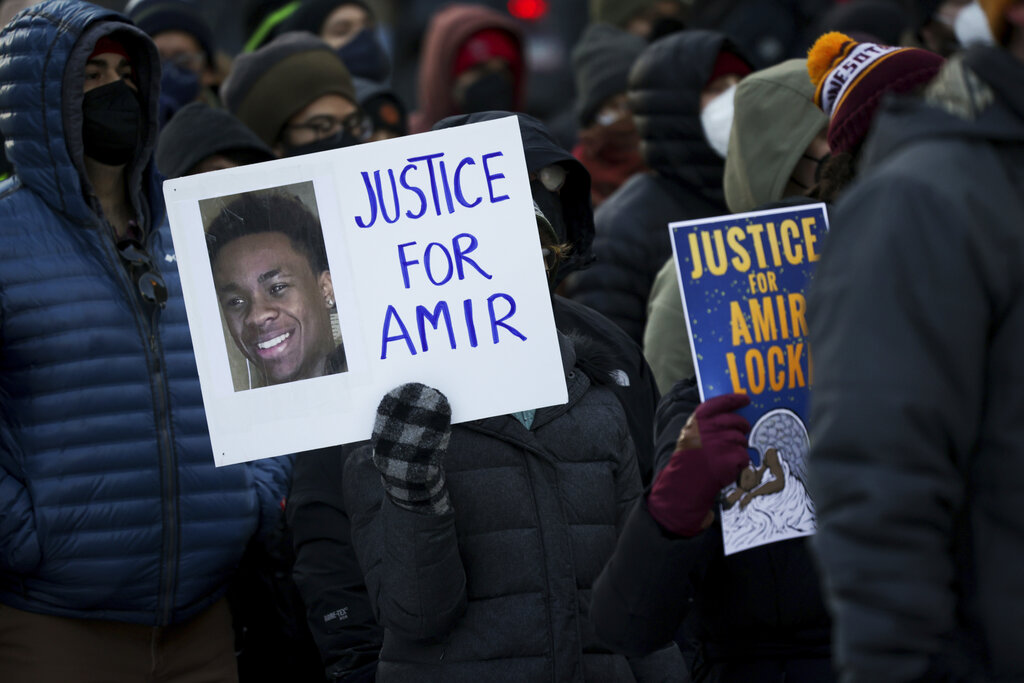
The Minneapolis Police Department has engaged in an illegal “pattern or practice” of racial discrimination, according to a state investigation that started after George Floyd was killed by an officer in the US city in 2020.
In a report released on Wednesday detailing the findings of a nearly two-year probe, the Minnesota Department of Human Rights concluded that Minneapolis police discriminated against Black people during the past decade.
Officials said they would be seeking to enter a court-ordered agreement with the city of Minneapolis to halt the practices and implement changes in the police department requiring independent oversight.
“Race-based policing is unlawful and harms everyone, especially people of color and Indigenous community members – sometimes costing community members their lives,” Rebecca Lucero, commissioner of the Minnesota Department of Human Rights, said in a statement.

The department began its investigation after former Minneapolis officer Derek Chauvin pinned his knee to Floyd’s neck for several minutes as the unarmed Black man lay handcuffed and face down on the pavement in May 2020.
The incident sparked nationwide protests against police racism and brutality, and Chauvin was convicted of murder last year.
Three other officers were convicted in federal court earlier this year of violating Floyd’s civil rights.
The Human Rights Department said in its 75-page report on Wednesday that Minneapolis police arrest and use force against people of colour, particularly Black individuals, more frequently than white people in similar settings.
Minneapolis police also use covert social media to surveil Black people and Black organisations unrelated to any criminal activity.
The investigation also found that the city’s police consistently use racist, misogynistic and disrespectful language; officers and supervisors receive deficient training that emphasised a paramilitary approach, and there is a lack of accountability for officers who engage in misconduct.
Minneapolis police set up fake social media accounts and posed as members of the public to criticize elected officials and surveil Black activists and organizations *without a public safety objective*, according to the state Dept of Human Rights investigation. pic.twitter.com/pdIa9BVlmn
— Max Nesterak (@maxnesterak) April 27, 2022
Moreover, they said former and current Minneapolis leaders “have not collectively acted with the urgency, coordination and intentionality necessary to address racial disparities in policing to improve public safety and increase community trust”.
State investigators reviewed a decade of data on traffic stops, searches, arrests and use-of-force incidents, and examined policies and training. They invited citizens to submit their own stories of encounters with Minneapolis police.
Minneapolis city council members and residents had pushed to replace the department with a new public safety unit that would take a public health approach to policing, including dropping a required minimum number of police officers.
But local voters rejected the proposal last year.
Minneapolis Mayor Jacob Frey and Police Chief Medaria Arradondo, before his retirement in January, said they were making changes in the department, including requiring officers to document attempts to de-escalate situations and to no longer stop motorists for minor traffic violations.

But anger at police flared anew in February when Minneapolis police officers serving a no-knock warrant shot and killed Amir Locke, a 22-year-old Black man who was sleeping on a couch in his cousin’s apartment at the time of the shooting.
Prosecutors declined to charge the officer who shot Locke, saying body camera video showed him pointing a gun at the officer, a claim Locke’s family has disputed. The city has since banned no-knock warrants except in the most extreme circumstances, such as a hostage situation.
The US Department of Justice is also investigating Minneapolis policing practices.







